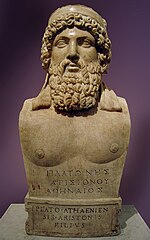of Plato. Crantor was probably born around the middle of the 4th century BC, at Soli in Cilicia (modern-day Turkey). He moved from Cilicia to Athens in...
7 KB (729 words) - 17:02, 26 May 2024
Soli/Pompeiopolis (Ancient Greek: Πομπηϊούπολις), was an ancient city and port in Cilicia, 11 km west of Mersin in present-day Turkey. Located in Southern Anatolia...
15 KB (1,554 words) - 22:29, 12 May 2024
native of some town, perhaps the Laerte in Caria (or another Laerte in Cilicia). Another suggestion is that one of his ancestors had for a patron a member...
36 KB (3,961 words) - 03:10, 23 May 2024
..29G. doi:10.1016/j.icarus.2006.04.001. de la Fuente Marcos, C.; de la Fuente Marcos, R. (2013). "Crantor, a short-lived horseshoe companion to Uranus"...
157 KB (15,472 words) - 05:41, 14 June 2024
the Academy include Aristotle, Heraclides, Eudoxus, Philip of Opus, and Crantor. In at least Plato's time, the school did not have any particular doctrine...
27 KB (3,441 words) - 12:59, 2 May 2024
Academy (category CS1 German-language sources (de))
include Aristotle, Heraclides Ponticus, Eudoxus of Cnidus, Philip of Opus, Crantor, and Antiochus of Ascalon. After a lapse during the early Roman occupation...
69 KB (8,712 words) - 09:45, 5 June 2024
Alexandria - Theophilos Corydalleus - Theosophy (history of philosophy) - Crantor - Crates of Athens - Crates of Mallus - Crates of Thebes - Cratippus of...
23 KB (2,232 words) - 06:35, 1 June 2024
commentaries on the dialogues were written in the early Academy until Crantor (died about 290 BCE). The dogmatists were followed by 'skeptics' who interpreted...
55 KB (7,421 words) - 03:54, 20 February 2023





